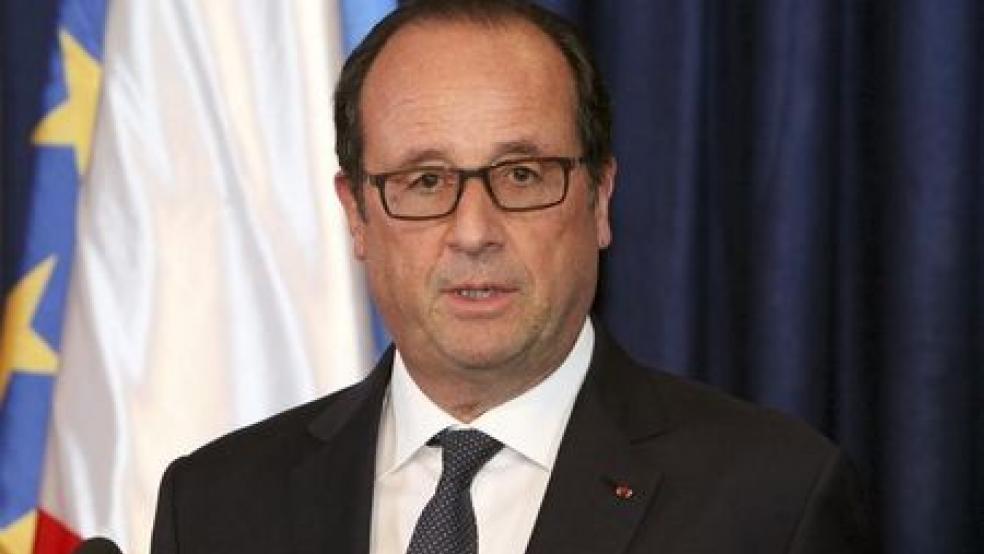France has declared that it is in a state of war with ISIS following last week’s terror attacks on Paris but President Francois Hollande has so far avoided pulling out his biggest gun: invoking Article 5 of the North Atlantic Treaty, which obliges all members of NATO to regard an attack on one as an attack on all.
Hollande has invoked the European Union’s Lisbon treaty, which contains a mutual defense clause, but some analysts suggest that there are multiple reasons why Hollande might be reluctant to pull NATO into the fight against the so-called Islamic State.
Related: Will France Call on NATO to Join the Fight Against ISIS?
One reason is that in vowing a strong and continued response to the attacks, France has drifted closer to Russia and to Russian President Vladimir Putin, whose air force is already engaged in Syria – although most of its efforts have been focused on bombing rebels opposed to Syrian dictator Bashar al-Assad.
The Russian president has publicly declared Russia’s opposition to ISIS and his forces have so far hit just enough ISIS-related targets for him to declare that eradicating the group is part of the Russian mission. However, things appear to be changing with the claim Tuesday by Russian authorities that a Russian charter airliner that disintegrated over Egypt with more than 200 passengers aboard last month was destroyed by a terrorist’s bomb, most likely planted by ISIS, which has claimed credit.
Russia claims to be stepping up assaults on ISIS. Reports Tuesday indicated that Putin has directed Russian naval assets in the Mediterranean to cooperate with French forces and that a Russian guided missile attack struck the ISIS stronghold of Raqqa.
If Hollande appreciates Russia’s response, it’s likely he would think twice about trying to bring NATO into the fight. An organization largely seen as antagonistic to Russia and to the former Soviet Union before it, NATO has been the subject of many angry speeches from Putin, who claims the organization is trying to put Russia in a “cage.”
Related: Christians Only? Debate Over Syrian Refugees Quickly Turns Toxic
Another reason, according to Hofstra University Law Professor Julian Ku, is that the facts on the ground in Syria make the invocation of the treaty superfluous.
“The main legal purpose of Article V was (is) to allow NATO countries to act consistently with the U.N. Charter’s limitations on the use of force (such as they are),” he writes. “Invoking Article V should allow the U.S. to use armed force to assist France consistently with the U.N. Charter.
“That might have mattered if the U.S. and France weren’t already using military force against ISIS in Syria in ways somewhat inconsistently with the U.N. Charter. But they have been bombing for months already, so I am not sure it is even worth invoking Article V at this point.”
A third, though somewhat unlikely, possibility is that the U.S. might not support a NATO resolution. That’s not to say that the Obama administration would oppose a request put before NATO to invoke Article 5, but rather that it might try to dissuade France from taking that step in the first place, preferring to keep the Syrian conflict somewhere in the gray area between peace and all-out war.
“The United States in particular also needs to be very careful about any formal declaration of war,” writes Anthony H. Cordesman, the Arleigh A. Burke Chair in Strategy at the Center for Strategic & International Studies. “Such action raises serious issues about the rights of combatants, how you legally define ISIS as an opponent, and other problems in international law. Political rhetoric about ‘war’ is inevitable, but we should back away from it as much as we can. A formal declaration of war against a claimed state with international networks is a potential legal nightmare.”
In the end, it would be virtually impossible for the U.S. to refuse a request for aid from its oldest ally, but such a request might wind up changing little on the ground in terms of military action and opening up a political can of worms.





